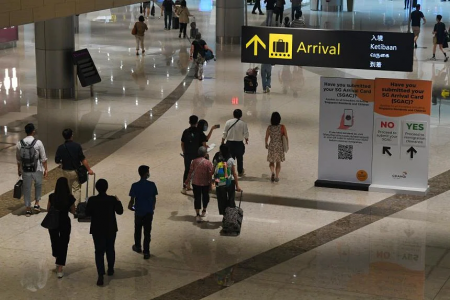S’pore ready to step up border measures if needed, MOH monitoring situation as China reopens
The Ministry of Health (MOH) stands ready to step up border health measures if necessary, and is closely monitoring the global Covid-19 situation even as China reopens its borders from Jan 8, 2023.
As air travel with China is progressively restored, MOH will take a cautious approach towards increasing seat capacity on planes, taking into account the overall public health assessment, the ministry said.
Despite some public concern about the large number of infections in China and announcements by other countries such as India, Italy and Japan of new testing requirements for all travellers from China, Singapore’s local situation has remained stable even after the XBB sub-variant wave, said MOH.
At this stage of the pandemic, the most important factor is Singapore’s population immunity.
MOH said: “We cannot completely stop infections, and indeed the virus has continued to circulate in our communities, but we can ensure that infections result in few cases of hospitalisations and severe illnesses.”
Singapore’s seven-day moving average of local Covid-19 cases is 729, the number of Covid-related hospitalisations remains below 100, and the number of Covid-19 patients in intensive care remains in the single digits, MOH said.
Paediatric and bivalent vaccines are available to strengthen the nation’s already high immunity, it added.
With new Covid-19 treatment facilities and expanded transitional care facilities also available, Singapore is in a stronger position to live with the virus, becoming more resilient with each wave, MOH stressed.
However, the ministry remains vigilant, closely watching the global situation, especially with an increase in caseloads in many countries due to the uptick in international travel and onset of winter in the Northern Hemisphere.
China, which is facing a large infection wave, is currently of particular concern.
First, there is the possible emergence of new and more dangerous variants, MOH said.
Singapore has been working with our international partners, including Gisaid, which maintains a pathogen genomics database, to monitor the variants circulating globally.
Singapore also conducts its own genomic surveillance on local and imported cases. So far, based on the sequencing results submitted by the Centres for Disease Control of various Chinese cities, the strains circulating in China are known ones, and no new variants with greater transmissibility or severity than previously identified sub-variants have been detected, MOH said.
Singapore’s airport now sees 700 to 1,000 arrivals from China daily, or about 1 per cent to 1.5 per cent of total daily arrivals by air. The majority are residents and long-term pass holders returning to Singapore.
On a weekly basis, MOH has detected between 40 and 80 Covid-19 cases from among these travellers. All of them exhibited mild symptoms, except one returning Singaporean who had become severely ill after recent travel to China.
Currently, non-fully vaccinated travellers entering Singapore continue to require a pre-departure test within two days before departure.
Non-fully vaccinated short-term visitors must also have travel insurance with a minimum coverage of $30,000 for Covid-related medical expenses. All air and sea travellers must submit a health declaration upon arrival.
Get The New Paper on your phone with the free TNP app. Download from the Apple App Store or Google Play Store now

